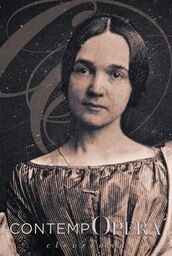by Jarrett Hoffman

She worked to revise the diary as a book, but died nineteen years before its eventual publication under the name A Diary from Dixie. Writers and historians continued to study the text as they discovered more of her papers, and the work’s staying power was affirmed when a 1981 annotated version won the Pulitzer Prize for History.
That woman’s perspective on the Civil War will now make its way to the opera stage. On Friday, June 15 at 7:00 pm at Cleveland Public Theatre’s James Levin Theatre, ContempOpera/ Cleveland will present the premiere of Mary Chesnut by Steven Mark Kohn, composition faculty at the Cleveland Institute of Music. Soprano Andrea Anelli will take the title role in this production directed by Marla Berg and featuring Lorenzo Salvagni at the piano.
A one-woman, one-act opera, Mary Chesnut will be preceded by more of Kohn’s music: six pieces from his collection Folk Song Settings, to be sung by baritone Brian Keith Johnson. A second performance will take place on Sunday, June 17 at 3:00 pm — tickets for both days are available here.
I recently spoke with Andrea Anelli, who called Mary Chesnut a jewel of a work, as well as one that’s quite deep. “It’s not a surface piece at all,” said the soprano, who is also ContempOpera’s founding director. “It really makes you think about the individual as well as the collective experience of the war. It’s history, fine art, music, literature — all of those things. I love it — am I getting that across? I love it.”

is instance I had this 400-page diary to really get to know her — and she was so forthcoming with her opinions and feelings.”
How does the soprano see Chesnut? “I like her — I found her to be very insightful and intelligent,” Anelli said. “She did have an underlying impatience with people — I guess I felt some commonality with her in some of my less lovable attributes.”
One thing’s for sure, Mary Chesnut had charm. “She was often sought out by men — even the president of the Confederacy, Jefferson Davis — not because she was a great beauty but because she was so intriguing to speak with.” Chesnut writes about Davis taking a seat by her on the sofa: “He seems to prefer my company to his generals.”
Anelli pointed out Chesnut’s progressive views on slavery — “Ours is a monstrous system, and wrong and an iniquity,” she wrote. The soprano also noted that Chesnut was fairly feminist for her time. “She talks about how the master of the house is held up as the epitome of goodness, and the pillar of the church and community — and yet, all around your home there are children of servants who bear a resemblance to him. She said, ‘This generation of women will not tolerate that.’”
Considering Chesnut’s upbringing and the culture she was immersed in, Anelli is impressed by the writer’s ability to recognize injustice. “That’s the kind of quality I saw in her that I was really attracted to and that I respected.”
Dramatically, the opera left a strong impression on Anelli. “Steve found a way to almost have a feeling of time travel. You get deeper and deeper into her reality.” Musically, an Americana sound pervades — one reason that Kohn’s Folk Song Settings make a fitting partner to the work. Anelli praised his brilliance at achieving that sound world.

Kohn’s style strikes a balance that makes a good match with the story of Mary Chesnut. “At different times throughout this piece he makes you feel like you’re in another time, but hex still has a way of writing music that’s unique and shows it wasn’t composed 100 years ago. It’s brilliant in that way.”
Aside from the historical element of the opera, Anelli said that Kohn conveys its emotional journey — from talk of a potential war, to the devastation of Sherman’s March to the Sea, “to the astonishment that your home still stands, and the realization that you’ve lost almost every man you know.”
Published on ClevelandClassical.com June 12, 2018.
Click here for a printable copy of this article


